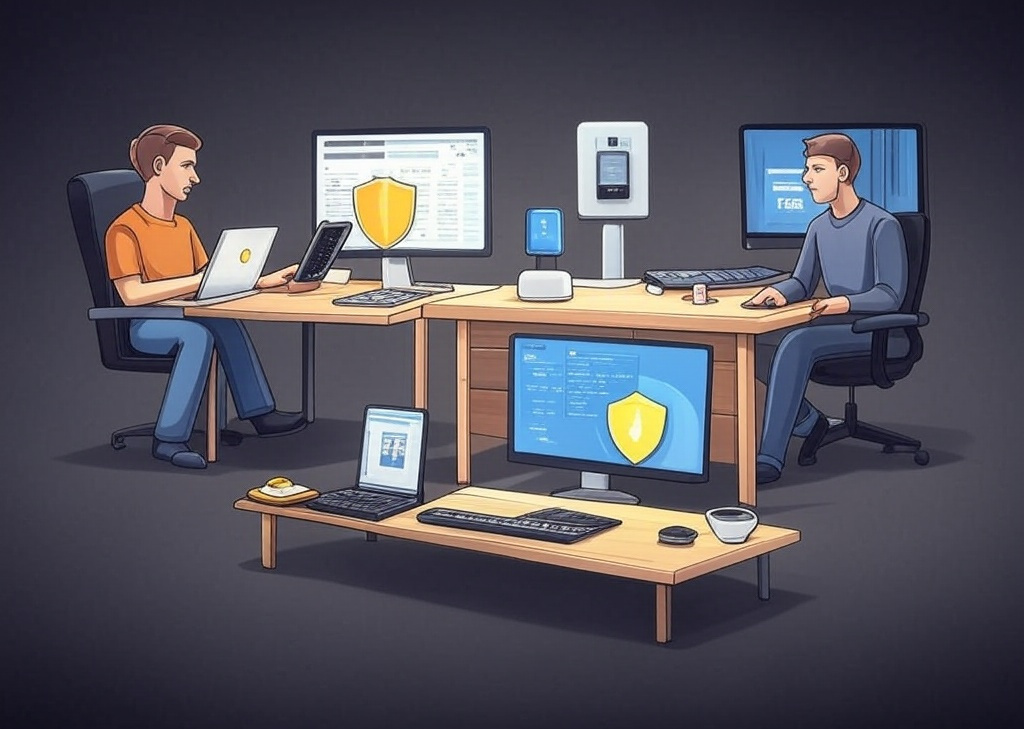The Ultimate VPN Guide for 2025
Everything You Need to Know About VPNs
Welcome to the definitive guide to VPNs in 2025! Whether you’re new to virtual private networks or looking to upgrade your knowledge, this guide has you covered. From privacy protection to streaming and gaming, we’ll explain what a VPN does, how it works, and how to choose the best one for your needs.
What Is a VPN and Why Use One?
A Virtual Private Network (VPN) encrypts your internet traffic, routing it through a secure server to mask your IP address. This keeps your online activity private and unlocks a world of possibilities. Here’s why you might need one:
- Privacy: Shields your data from ISPs, governments, and hackers—essential on public Wi-Fi.
- Streaming: Bypasses geo-restrictions for Netflix, Disney+, or BBC iPlayer, no matter where you are.
- Gaming: Reduces ping, protects against DDoS attacks, or finds easier lobbies in games like Call of Duty.
- Travel: Access your home country’s content or avoid censorship abroad.
Why 2025 Matters: With global internet regulations tightening, cyber threats like ransomware on the rise, and streaming platforms cracking down on geo-restrictions, a VPN is more crucial than ever. For instance, in 2025, several countries have introduced stricter data retention laws, making it vital to protect your digital footprint. Additionally, the growth of cloud gaming and 5G networks means VPNs can optimize your connection for low-latency experiences, whether you're playing on a console or a mobile device.
How Does a VPN Work?
When you connect to a VPN, your device establishes an encrypted tunnel to a server operated by the VPN provider. Your real IP is replaced with the server’s IP, making it look like you’re browsing from that location. It’s like a digital disguise—simple but powerful.
The Encryption Process: Most VPNs use AES-256 encryption, the gold standard also used by banks and militaries. This ensures that even if someone intercepts your data, they can’t read it without the decryption key. The VPN server acts as a middleman between you and the internet, forwarding your requests while keeping your identity hidden.
Real-World Example: Imagine you’re in a coffee shop using public Wi-Fi. Without a VPN, a hacker could potentially see your browsing activity or steal your login credentials. With a VPN, your traffic is encrypted, and your IP is masked—say, showing you’re in New York while you’re actually in London. This not only secures your data but also lets you access content restricted to the U.S., like a Netflix show unavailable in the UK.
How to Choose the Right VPN
With hundreds of VPNs out there, picking the right one can feel overwhelming. Here’s a breakdown of key factors to consider:
| Factor | What to Look For |
|---|---|
| Speed | Opt for WireGuard or NordLynx—top VPNs hit 900+ Mbps on fast connections. |
| Security | AES-256 encryption, no-logs policy (audited), kill switch are non-negotiable. |
| Price | Plans range from $2-$12/month—longer subscriptions (1-2 years) save more. |
| Servers | 3,000+ servers across 60+ countries ensure flexibility and speed. |
| Features | Streaming support, gaming optimization, or unlimited devices (like Surfshark). |
Check our comparisons for head-to-head matchups.
Additional Considerations for 2025
- Device Compatibility: Ensure the VPN supports all your devices—Windows, macOS, iOS, Android, Linux, and even smart TVs or routers. In 2025, with the rise of IoT devices, some VPNs like ExpressVPN now offer dedicated apps for smart home systems, ensuring your entire network is protected.
- Customer Support: Look for 24/7 live chat support. If you’re trying to unblock a streaming service at 2 a.m., you’ll want help immediately. Providers like NordVPN and ExpressVPN excel here with responsive support teams.
- Trial Periods and Refunds: Most premium VPNs offer a 30-day money-back guarantee. Test the service risk-free to ensure it meets your needs—especially for specific use cases like gaming or torrenting.
Practical Tip: If you’re a gamer, prioritize VPNs with servers close to your game’s data centers. For example, if you’re playing Valorant and the nearest server is in Singapore, choose a VPN with a strong presence in Southeast Asia to minimize latency.
VPN Protocols Explained
The protocol is the tech that powers your VPN’s speed and security. Here’s a quick rundown of the best in 2025:
- WireGuard: Lightning-fast and open-source—used by NordVPN, Surfshark, and CyberGhost.
- OpenVPN: Rock-solid security, widely supported, but slower—great for privacy buffs.
- NordLynx: NordVPN’s custom take on WireGuard, blending speed and encryption.
- Lightway: ExpressVPN’s proprietary protocol—fast and lightweight.
Which Protocol Should You Choose? For most users, WireGuard or NordLynx offers the best balance of speed and security. If you’re in a high-censorship region (e.g., China), OpenVPN’s robust encryption can help bypass firewalls, though it may slow your connection. In 2025, some VPNs are also experimenting with hybrid protocols, combining WireGuard’s speed with additional obfuscation layers to evade detection by advanced firewalls.
Emerging Trends: In 2025, we’re seeing the rise of quantum-resistant protocols. With quantum computing on the horizon, VPN providers like ProtonVPN are starting to integrate post-quantum cryptography to future-proof their services against potential threats.
Are VPNs Worth It?
Yes, for most users! Premium VPNs (starting at $2/month) offer peace of mind and versatility that free options can’t match. Speaking of which, explore our take on free VPNs.
The Case for Premium VPNs
- Reliability: Free VPNs often have limited servers, leading to slow speeds and frequent disconnects. Premium VPNs like NordVPN or ExpressVPN provide consistent performance with thousands of servers worldwide.
- Security: Free VPNs may log your data or show ads, compromising your privacy. Premium VPNs adhere to strict no-logs policies, often independently audited, ensuring your data stays private.
- Features: Premium VPNs offer extras like split tunneling (route some traffic outside the VPN), dedicated IPs for specific use cases, or ad-blocking features like NordVPN’s Threat Protection.
Free VPNs: A Word of Caution: While free VPNs like ProtonVPN’s free tier can be useful for basic browsing, they often come with limitations—fewer servers, slower speeds, and data caps. Worse, some free VPNs have been caught selling user data to third parties. If privacy is your priority, investing in a premium VPN is the safer bet.
VPN Use Cases in 2025: Beyond the Basics
VPNs have evolved far beyond simple privacy tools. Here are some advanced use cases for 2025:

- Remote Work Security: With hybrid work models still prevalent, VPNs ensure secure access to company networks, especially on unsecured Wi-Fi. Some VPNs, like Surfshark, now offer business plans with centralized management for teams.
- Smart Home Protection: As smart devices proliferate, VPNs can protect your entire network. For example, setting up a VPN on your router ensures your smart thermostat, cameras, and speakers are secure from hackers.
- Torrenting Safely: VPNs with P2P-optimized servers (like those from CyberGhost) allow safe and anonymous torrenting, protecting you from ISP throttling or legal notices in regions with strict copyright laws.
- Accessing Decentralized Web (Web3): In 2025, the rise of Web3 and decentralized apps (dApps) has increased the need for VPNs to access region-locked blockchain services or protect your identity while interacting with crypto platforms.
Common VPN Myths Debunked
There’s a lot of misinformation about VPNs. Let’s clear up some myths:
- Myth: VPNs Make You Completely Anonymous: While VPNs hide your IP and encrypt your traffic, they don’t make you invisible. Your browsing habits can still be tracked via cookies, browser fingerprinting, or if you log into accounts like Google.
- Myth: All VPNs Slow Your Connection: Modern VPNs like NordVPN or ExpressVPN have minimal impact on speed—often less than 10% loss on a fast connection—thanks to protocols like WireGuard.
- Myth: VPNs Are Only for Tech Experts: Not true! Most VPNs in 2025 are user-friendly, with one-click connect features and intuitive apps for all devices, even for beginners.
Tips for Maximizing Your VPN Experience
Here are some practical tips to get the most out of your VPN in 2025:
- Choose the Right Server: For streaming, pick a server in the country of the content you want to access (e.g., a U.S. server for Netflix US). For speed, connect to the closest server to your location.
- Use Split Tunneling: If you only need a VPN for specific apps (like a torrent client), use split tunneling to route only that traffic through the VPN, keeping your regular browsing unaffected.
- Enable the Kill Switch: This feature cuts your internet if the VPN disconnects, preventing accidental data leaks. It’s a must-have for privacy-conscious users.
- Regularly Update Your VPN App: Providers often release updates to improve performance, fix bugs, or patch security vulnerabilities. Keeping your app updated ensures you’re always protected.
The Future of VPNs: What’s Next?
In 2025, VPN technology continues to evolve. Here’s what to watch for in the coming years:
- AI-Driven Features: Some VPNs are integrating AI to automatically select the best server based on your activity—whether you’re streaming, gaming, or browsing.
- Expanded Mesh Networks: Providers like Surfshark are experimenting with mesh VPNs, allowing users to create private networks with friends or family for secure file sharing.
- Integration with Privacy Ecosystems: VPNs are increasingly bundled with other privacy tools, like encrypted email or secure cloud storage, as seen with ProtonVPN’s Proton ecosystem.
As the digital landscape shifts, VPNs will remain a cornerstone of online privacy and freedom. Whether you’re protecting your data, unblocking content, or optimizing your gaming, a good VPN is an investment in your digital life.
Frequently Asked Questions
Are VPNs legal? Yes, in most countries (exceptions: China, Russia—check local laws).
Do VPNs slow your internet? Top-tier providers limit loss to 5-10%—barely noticeable.
Can I use a VPN on my phone? Absolutely—apps work on iOS, Android, and more (see our setup guide).
Get Started
Ready to dive in? Explore our VPN reviews or compare top picks like NordVPN vs CyberGhost to find your perfect match.
